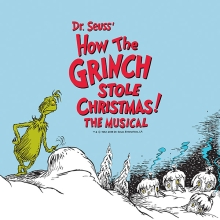Filichia Features: Double, Double, Less Toil and Trouble

Filichia Features: Double, Double, Less Toil and Trouble
If you're the director of a regional theater, you try to keep your expenses to a minimum.
Those who head community or student groups sometimes find that not enough people show up at auditions.
Whatever the case, there are a few ways that you can use doubling to solve your woes.
I'm not talking about standard doubling, where a performer has a track -- as student actor Jerry Zaks had at Dartmouth University in Wonderful Town. He played a Greenwich Village eccentric in Wonderful Town's first scene before becoming a Brazilian admiral, an Irish cop and a few other people, too.
And why do I bring him up, you ask? To make the point that all ensemble members should adopt the marvelous attitude that Zaks - now a four-time Tony-winning director - had when he was a member of the chorus. As he's said on more than one occasion "I'd go backstage and say to myself 'All these costumes are mine!'"
(Is there any better proof of the bromide "There are no small parts, only small actors?")
I'm also not talking about double-casting - meaning that one woman plays Elle Woods this week and another portrays her the next. Such a decision is often made by directors who can't break the hearts of two equally talented performers. But where else but school and occasionally community theater does double-casting ever happen? Yes, in professional theater, there are some roles that are deemed too arduous to perform eight times a week, so a second performer takes the matinees. Aside from that, however, a professional director goes through casting, decides on one performer and gives the other the bad news. That's life -- or, more to the point, that's show business.
Anyway, the doubling to which I refer is using one performer for two different roles by virtue of the fact that the two characters never appear in one scene together. I've now seen plenty of productions of Mary Poppins where Bird Woman who sings "Feed the Birds" in Act One returns in Act Two as Mrs. Andrew, the terrifying nanny.
Has anyone given a thought to having the actress playing the evil Mrs. Meers in Thoroughly Modern Millie also portray Miss Flannery, who administers "The Speed Test"? Audiences enjoy an actress who can adopt two distinctly different voices, which these two characters have.
There was a Canadian production of The Diary of Adam and Eve - solely the first act of Bock and Harnick's The Apple Tree. Tom Kneebone played Adam, Dinah Christie was Eve and as the Snake, Tom Kneebone.
Adam is nowhere to be found during the scene in which the Snake tempts and conquers Eve. So why not use the same actor? Snake would be wise to make himself resemble Adam, for by this point in the story, Eve is well on her way to loving him. So that would give him some extra sway over her.
"Wait," you're saying, "The Apple Tree consists of three different stories, so you'll still need two guys for the other tales." True - but chances are that one of your men is a better singer than the other. So use him for both Adam and Snake, for the latter actually has more lyrics than lines.
Ernest in Love -- the marvelous musical version of Oscar Wilde's The Importance of Being Earnest -- follows the template where Algernon has a butler called Lane and Jack has one called Merriman. But we can see only one house at a time, so you can have one actor play both parts. For that matter, your performer can be a triple threat, for he can also play Reverend Chasuble, too, who's only on when the butlers aren't.
In Damn Yankees, after Mr. Applegate morphs Joe Boyd into Joe Hardy, the middle-aged overweight man disappears until the final scene when Hardy returns to his previous life as Boyd.
During the performance, the actor playing Boyd could go out for a six-course meal and still be back in time for his next scene, for it's only the final one. Or you could put a mustache and beard on him during his first scene, have him discard them quickly for the next scene and -- presto, change-o! -- Boyd is now Benny Van Buren, the manager of the hapless Washington Senators.
After all, haven't many managers of baseball teams often devolved into Joe Boyd's physique?
I'm sure there are many other examples of this now-you-see-him, now-you-don't casting. When you think of it, this may be the only case in the world where one head is better than two.
You may e-mail Peter at pfilichia@aol.com. Check out his weekly column each Monday at www.broadwayselect.com and Tuesday at www.masterworksbroadway.com . His book, The Great Parade: Broadway's Astonishing, Never-To-Be Forgotten 1963-1964 Season is now available at www.amazon.com.

























